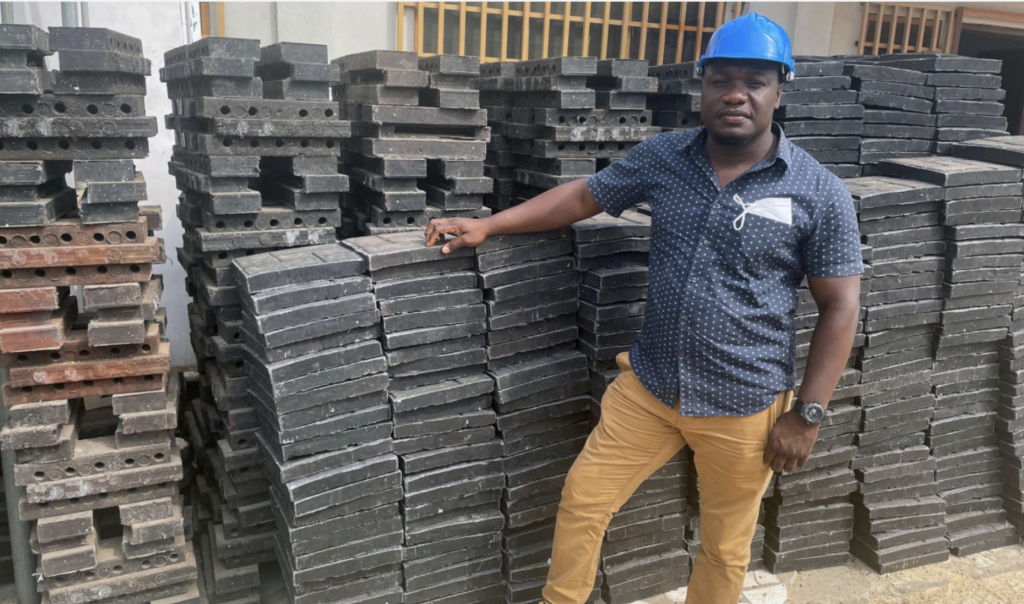By Albert Oppong-Ansah
Accra, May 30, GNA – Plastic waste clogs gutters and litters streets, but an ambitious new initiative is transforming single-use plastic pollution into sustainable building materials.
Two local companies, Nelplast Ghana Limited and Integrated Recycling and Compost Plant (IRECoP), have partnered in a pioneering project to convert discarded plastic into durable bricks.
Under the Community-Based Sustainability Zero Plastic Waste Project (SCZWP), the initiative aims to recover 90 per cent of single-use plastic waste by 2030.
With funding from the Global Environment Facility (GEF) through the United Nations Industrial Development Organisation (UNIDO), the project seeks to reduce plastic pollution while addressing Ghana’s housing and infrastructure challenges.
The two-year initiative has been hailed as a model for circular economy innovation, aligning with national policies such as the National Planning Strategy.
Waste to Worth
Madam Betty Brown Nyadu, General Manager of IRECoP, said that her organisation would recover single-use plastics from mixed waste.
The company is setting up a network of over 200 waste collectors to retrieve sachet water wrappers, carrier bags, and film plastics, which are often non-recyclable and either burned or dumped in landfills.
“Single-use plastics are among the most problematic waste materials in Ghana,” said Nyadu.
“They’re lightweight, hard to recycle, and found everywhere. But this project gives them a second life, with real value.”

Collected plastics are cleaned, sorted, and compacted before being transported to a green construction start-up specialising in eco-friendly materials.
Plastics that Build
At Nelplast’s facility, plastics are shredded, melted, and mixed with sand to create weather-resistant building blocks.
These bricks are used for walkways, school buildings, and low-cost housing, according to Mr. Nelson Boateng, CEO of Nelplast Limited.
“The blocks are stronger than conventional cement bricks, water-resistant, and excellent for insulation,” explained Boateng.
“More importantly, they reduce construction costs by up to 30% while helping clean up our environment.”
He noted that one classroom block can be constructed using the equivalent of 13,000 plastic bags.
Creating Jobs, Empowering Communities
The GEF, through UNIDO’s natural sciences programme, is supporting the project with a $400,000 grant for equipment, training, and pilot construction projects in Greater Accra, Ashanti, and Volta regions.
UNIDO’s role includes technical support, environmental education campaigns, and partnerships with local governments and schools.
The project is already generating employment in waste-prone communities.
In James Town, 29-year-old Adwoa Mireku, a former street hawker, now earns a stable income as a plastics collector.
“I used to throw sachets away like everyone else. Now, I collect them and get paid. I never thought waste could build a future for me,” she said.
Both companies are collaborating with vocational schools to train youth in eco-construction methods and plan to partner with local governments to build community toilets and classrooms using plastic bricks.
Environmental Benefits
Without this recovery and value-addition model, tonnes of plastic waste would end up in landfills or be burned.
Dr Glenn K. Gyimah, Project Manager at Jospong Group, warned that plastic pollution significantly contributes to carbon emissions throughout its lifecycle, from production to disposal.
He explained that the high plastic waste generation in urban cities, coupled with low degradability, leads to excessive landfill use.
Burning plastics releases harmful compounds, including carbon dioxide, methane, and particulate matter, which cause respiratory diseases.
Dr Gyimah stated that Persistent Organic Pollutants (POPs), produced through open burning or poor incineration, are particularly prevalent where plastic waste is disposed of irresponsibly.
Soils surrounding dumpsites have tested high levels of dioxins beyond acceptable limits due to indiscriminate burning of plastics.
Prolonged exposure to dioxins can be carcinogenic to humans.
These pollutants pose serious health risks to unborn babies, infants, and children, who may be exposed through maternal contact or direct environmental exposure.

Ghana generates over 840,000 tonnes of plastic waste annually, yet less than 10 per cent is recycled.
Looking Ahead
With rising concerns over climate change, flooding, and sanitation, this project offers a promising blueprint for plastic circularity and climate-smart infrastructure.
Environmental analysts commend its integrated approach, linking waste retrieval, job creation, and low-cost housing through local innovation and action.
As construction begins on the first demonstration block in a peri-urban school outside Accra, the hum of machines and the click of plastic bricks signal a new era of progress, where pollution is repurposed rather than removed.
GNA
Edited by Kenneth Sackey
GNA
